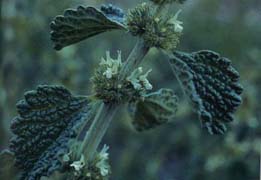User Login |
Wild MintWild Mint
Family Name: Mint (3) Family Name: Lamiaceae (3)
Latin Name: Mentha arvensis
Common Name: Wild Mint, Field Mint (1:244)
Related Species: Genus Species
Body System Affiliations: Digestive System (3)
Botanical Description: Habit: Perennial (1:244), Open-shade, moist (3) Size: 15-80 cm tall (1:244) Leaves: “Opposite, lance-shaped to oval, 1-8 cm long, short-stalked, usually gland-dotted; margins saw-toothed” (1:244) Flowers: “White to pale-purple or pink, 4-7 mm long; sepals fused into a glandular-hairy, 5-lobed tube; petals fused into a short 4-lobed tube; stamens 4, sticking out from flowers; 4-lobed ovary; numerous in whorled clusters in leaf axils” (1:244) Fruit: 4 nutlets (1:244) Underground Parts: creeping rhizomes (1:244)
Ecology: Habitat: streambanks, wet meadows and clearings, springs, seepage areas, lakeshores, beaver wetlands; common at low to middle elevations (1:244)
Western (European-American) Uses/Relationships: Food: tea & flavoring (1:244) Medicine: Part Used: Leaves Medicinal Actions: Indications: Body System Associations: Digestive Preparation: tea=place a small handful of dried leaves in a tea-pot, pour in boiling water, let steep for several minutes (1:244)
Indigenous and Non-Western Use/Significance/Relationships: Medicine: Indigenous Group: Nuxalk (1:244) Part Used: Leaves Indications: Stomach pains (1:244) Preparation: Tea (1:244)
References Cited:
1. Mackinnon, Andy, and Jim Pojar. Plants of the Pacific Northwest Coast. Vancouver, British Columbia: Ministry of Forests and Lone Pine Publishing, 1994.
3. Eloheimo, Marja. sayuyay Botanical Project: Educational Garden Plant List. The Evergreen State College: Healing Gardens, 2006.
categories [ sayuyay Sister Garden ]
login or register to post comments
|
